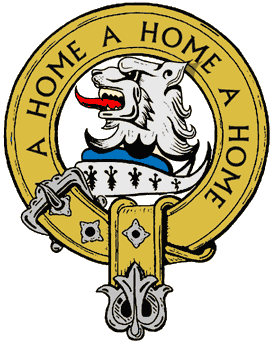
History of the Homes
The name of Home originates from an Old English word Hôm, which described a place on an hilly outcrop or height. The situation of Hume Castle readily explains this origin and through the ages it has been spelt in several different ways, appearing in documents over the past eight centuries in up to 8 various spellings. Always pronounced Hume, the barony, castle and village retained the Home spelling until the end of the 18th century; many families over the centuries have switched to the Hume version to avoid confusion of pronounciation for those living outwith the Borders, whilst others have retained the Home spelling.
THE EARLS OF DUNBAR AND THE FIRST USE OF THE NAME
The earls of Dunbar descended from Cospatrick the first earl (d. 1073), who on leaving England was given the earldom by Malcolm III on the forfeiture of the former’s earldom of Northumberland by William the Conqueror.
Cospatrick the first earl was descended paternally from Malcolm II King of Scotland (d. 1034), as his father, Maldred, was the son of Crinan the abbot of Dunkeld, who married Bethoc the daughter of Malcom II. It was Maldred’s brother Duncan (d. 1040) who succeeded King Malcolm II in 1034.
Cospatrick was maternally descended from Alfred the Great, King of the Anglo-Saxons (d. 899) as his mother Aldgitha was granddaughter to Aethelred, King of England (d. 1016). Aethelred, or Ethelred the Unready, as he is incorrectly described today, was the great great grandson of King Alfred.
The first earl’s grandson, Cospatrick III (d. 1166), married Derder (Deirdre) and had two sons: Waltheof (d. 1182) and Patrick of Greenlaw (d. 1229).
Waltheof’s son Patrick of Dunbar (d. 1232) married Ada (d. 1200), the natural daughter of William the Lion, King of the Scots. Patrick and Ada had a daughter called Ada of Dunbar.
Meanwhile, Sir Patrick of Greenlaw married Cecelia Frazier and had a son, William, styled Lord of Greenlaw (d. 1266).
William married his cousin Ada of Dunbar, daughter of Patrick 6th earl of Dunbar, who brought the lands of Home with her. Thereafter William was known by the territorial designation “Dominus de Home”, thus giving rise to the name of the clan. He was the first to use the name Home
From them are descended the many Homes and Humes who have subsequently either made their mark on our history or have contributed to maintaining the family name in many different ways, particularly in the affairs of Scotland from the mid 15th Century, and Britain and the empire from the 18th Century onwards. The Homes were the dominant magnates and lairds in the East March from the late 15th Century onwards; the wardenship of this March was held by them virtually without interruption right through to the Union of the Crowns in 1603 and they exercised dominant political power in Berwickshire through to the end of the 18th Century. Military involvement witnessed many gains, such as the early success of Lord Home at the Battle of Flodden in 1513 and many losses, particularly those of the Wedderburn Homes at that battle and at the battle of Dunbar in 1650. Different families of the name supported opposite causes especially during the time of Mary Queen of Scots and during the Jacobite rebellions, but between them all they left a fascinating built heritage which we can continue to admire today.
The direct line, descended from the first William, died out on the death of the 2nd earl of Home, whence the chiefly family passed to Sir James Home of Cowdenknowes, who became the 3rd earl in 1638. From the mainline also descended the Homes of Spot, George becoming earl of Dunbar under James VI & I, as did the Homes of Ninewells, the family of David Hume, the philosopher.
Descendants of the senior cadet line, the Homes of Wedderburn, included the Humes of Polwarth, who became earls of Marchmont, the first modern Scottish historian, David Home of Godscroft, Henry Home, Lord Kames and David Home, Lord Crossrigs, both eminent legal minds, as well as George Home of Spotsylvania who founded a large family of Humes in Virginia.
There are many others of note, including John Home, minister and playwright in the 18thC, Sir Everard Hume, the surgeon, Allan Octavian Hume, founder and first secretary of the Indian Congress Party in late 19thC. In our own era, our chief’s father, Lord Home of the Hirsel, Prime Minister and noted Foreign Secretary, Cardinal Hume Archbishop of Westminster, John Hume the Nobel Peace prize winner, together with other prominent folk in the worlds of fashion, the military, journalism, the arts and commerce, maintain the prominence of the name in the affairs of our time.
This information was given by express permission of the Clan Home Association. Many thanks to Lori Vaughan, Member Secretary for the Clan Home Association. for more Clan information, please visit their website. http://www.clan-home.org
